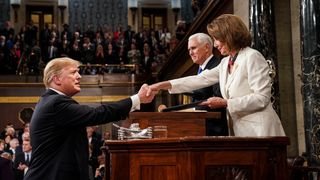The Democrats in the House of Representatives and the president of the United States are at war.
Speaker Nancy Pelosi and most of the House leadership do not want to attempt to impeach Trump, but events may force their hand – and that is exactly what Trump wants them to do.
The collapse of negotiations between the House Judiciary Committee and Attorney-General William Barr means that he will not supply the full, unredacted Mueller report demanded by Democrats, and he will likely not testify in person. The committee will vote Wednesday to hold the AG in contempt, and unless Barr blinks, the full House of Representatives will vote to hold him in contempt of Congress.
In addition to this impasse, there is a growing list of congressional demands for witnesses and documents – all of which have been met by unyielding rejection by President Trump, the White House and his attorneys:
- The White House is saying that Don McGahn, former White House counsel and the key witness for Mueller on obstruction of justice issues, will not be permitted to testify in Congress.
- Treasury Secretary Mnuchin has today refused to provide Trump’s tax returns to the Ways and Means Committee. Contempt proceedings will begin on that front shortly.
- Trump's lawyers have sued the chairman of the House Oversight Committee who is demanding Trump's financial records
The remedies available to the House are not attractive: issue subpoenas, hold witnesses in contempt for not showing up, getting votes in the House to hold witnesses in contempt of Congress, then going to court to enforce the subpoenas – by fines or even jailing the individuals if they do not comply.
Those processes will take months. Clearly, Trump sees a way to use legal process to run out the clock on this Congress until the 2020 elections.
For Democrats, this is a grave constitutional issue: the deliberate sabotage by the Executive of Congress' duties under Article I of the Constitution of the United States as to whether the president is, pursuant to his oath, taking care that the laws are faithfully executed, and that his Executive Branch departments are properly performing their responsibilities.
Trump sees a way to use legal process to run out the clock on this Congress until the 2020 elections
President Richard Nixon’s willful disobeyance of congressional subpoenas constituted Article 3 of the resolution of impeachment by the House Judiciary Committee in 1974.
Adding injury to insult, last week Speaker Nancy Pelosi accused the AG, in his testimony on the Mueller report in the Senate, of "not telling the truth to the Congress of the United States... that's a crime... Nobody is above the law, not the president of the United States, not the attorney general". For the House speaker to accuse a cabinet officer of committing a crime is a very big deal.
This is taking place in the context of an impending hearing in the House Judiciary Committee with Robert Mueller, the Special Counsel – if he chooses to testify even after Trump insisted he not do that.
The key question to be put to him will be: "If all the evidence you accumulated on obstruction of justice applied to someone who was not president of the United States, would you indict them?" Hundreds of legal scholars have answered that question in the affirmative. And if Mueller concurs, and answers, "Yes," then the House will have to figure out if impeachment is warranted – just as it did in 1974 for Nixon when the Judiciary Committee voted to impeach him for “violation of his constitutional duty to take care that the laws be faithfully executed [and] has prevented, obstructed, and impeded the administration of justice …”
These are the parallel tracks – the president’s conduct in office with regard to obstruction of justice, and the stonewalling by the White House and the Executive departments of the House’s demands for witnesses and documents – that could force a moment of truth on a decision to pursue impeachment.
Pelosi does not want to go down the impeachment road. The American people are not supportive. It can alienate the moderate Republican voters who gave Democrats a majority in the House last November. There are not 20 Republican senators who would be required to vote to convict and remove Trump from office. Impeachment would suck up all the air in Washington, frustrating the ability to establish and prosecute a legislative and issues agenda that will help the Democratic nominee win the 2020 election.
Impeachment 101: The history, process and prospect of a Trump impeachment

The best way for Democrats to take Trump out is to beat him decisively in the election.
The interesting question, however, is whether Trump wants the House to impeach him? The answer is yes. Trump is doing everything in his power to bring on impeachment because he knows impeachment is not popular. He knows it would look too political and he knows what happened to Republicans when President Clinton was impeached: Clinton’s popularity soared and the Republicans lost seats in Congress.
Trump knows impeachment can help further boost his standing – his polls are rising, with his approval rating now in the mid-40s – in the wake of “exoneration” in the Mueller report, a booming economy, and unemployment at a 50-year low. It does not matter to Trump that impeachment is seen as the ultimate disgrace. He just wants to win – in Congress and his re-election.
He’s not tired of winning yet. The House of Representatives may yet make his day.






